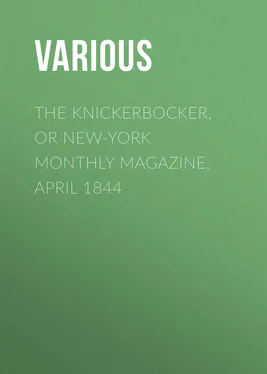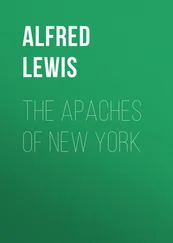Various - The Knickerbocker, or New-York Monthly Magazine, April 1844
Здесь есть возможность читать онлайн «Various - The Knickerbocker, or New-York Monthly Magazine, April 1844» — ознакомительный отрывок электронной книги совершенно бесплатно, а после прочтения отрывка купить полную версию. В некоторых случаях можно слушать аудио, скачать через торрент в формате fb2 и присутствует краткое содержание. Жанр: foreign_antique, periodic, foreign_edu, на английском языке. Описание произведения, (предисловие) а так же отзывы посетителей доступны на портале библиотеки ЛибКат.
- Название:The Knickerbocker, or New-York Monthly Magazine, April 1844
- Автор:
- Жанр:
- Год:неизвестен
- ISBN:нет данных
- Рейтинг книги:4 / 5. Голосов: 1
-
Избранное:Добавить в избранное
- Отзывы:
-
Ваша оценка:
- 80
- 1
- 2
- 3
- 4
- 5
The Knickerbocker, or New-York Monthly Magazine, April 1844: краткое содержание, описание и аннотация
Предлагаем к чтению аннотацию, описание, краткое содержание или предисловие (зависит от того, что написал сам автор книги «The Knickerbocker, or New-York Monthly Magazine, April 1844»). Если вы не нашли необходимую информацию о книге — напишите в комментариях, мы постараемся отыскать её.
The Knickerbocker, or New-York Monthly Magazine, April 1844 — читать онлайн ознакомительный отрывок
Ниже представлен текст книги, разбитый по страницам. Система сохранения места последней прочитанной страницы, позволяет с удобством читать онлайн бесплатно книгу «The Knickerbocker, or New-York Monthly Magazine, April 1844», без необходимости каждый раз заново искать на чём Вы остановились. Поставьте закладку, и сможете в любой момент перейти на страницу, на которой закончили чтение.
Интервал:
Закладка:
In this age of literary and multifarious pilgriming, it cannot be unacceptable to propose an excursion to a mansion dignified by its associations with such a name. Neither is it a slight recreation to him who has been confined for weeks and months within the dusky enclosures of London, to break his bounds and emerge into the breathing fields of Surry and Kent. The father of English poetry, and poet of English pilgrims, Chaucer himself, stands ready to accompany us for at least a small portion of our route: it was along the road on which we enter, that he conducted, ages ago, those pilgrims to the shrine of Canterbury who still live in his verses; and we may glance at the Tabard Inn whence they set forth, and indulge our fancy with the thought of their quaint equipments, while we betake ourselves to the modern ‘hostelrie’ of the Elephant and Castle, and commit our persons to the modern comforts of an English coach. Alas! for the fickleness of a world which changes its idols almost as often and as easily as its fashions. Time was when we should have found this great highway strewn with devotees hurrying to the shrine of St. Thomas à Becket. But now, though we might detect, no doubt, in the throng around us, the counterpart of each individual whom Chaucer committed to his living canvass; of the knight who ‘loved chevalrie’ and the Frankelein ‘who loved wine;’ of the young squire ‘with his locks in presse,’ and the fair lady who
——‘of her smiling was ful simple and coy,
Her gretest oathe n’as but by Seint Eloy;’
all as intent as of old upon objects not less fleeting, and changed in little but the fashion of their attire; now there is none so poor as to do reverence to the martyr-prelate for the sake of those merits which were once thought a sufficient covering for the sins of countless followers.
As the great eastern artery of London, the road which we have thus far followed begins to distribute its living mass into the successive provincial avenues which diverge from it, we find ourselves included in that portion of the throng, whom the pursuit of health or pleasure conducts toward Tonbridge. 1 1 This route leads, among other villages, through that of Sevenoaks, famous as the place where Jack Cade and his rabble overthrew the forces of Stafford, in the very same year, (1450,) when Faust and Gutenberg set up the first press in Germany, and long, therefore, before Cade could have justly complained, as Shakspeare has made him do, that the Lord Say had ‘caused printing to be used’ in England, and ‘built a paper-mill.’ But who taxes the sun for his spots or Shakspeare for anachronisms? He who was born to exhaust and imagine worlds, cannot of course be denied some innocent liberties with chronology. The village in question, however, is more interesting to travellers from being in the vicinity of Knole, the fine old seat of the dukes of Dorset. The stranger is led here through long galleries garnished with furniture of the time of Elizabeth and hung with portraits which at every step recall names of the deepest historical interest. Who can ever forget that which hangs or hung over the door of Lady Betty Germaine’s chamber? It is Milton in the bloom of manhood, and the immortal epic seems to be just dawning on those mild and pensive features. One chamber, of sumptuous appointments remains, (so runs the legend,) as it was last tenanted by James I., no head less sapient or august having been since permitted to press the pillow. In another every thing stands as it was arranged for the reception of the second James, who forfeited, it seems, a luxurious lodging at Knole at the same time that he forfeited his crown. The name of Lady Betty Germaine, Swift’s friend and correspondent, connects the place with all the celebrities of the reign of Queen Anne. On emerging from the building we view the magnificent groves of the park, fit haunt for nightingales, though Becket is said to have driven them by an anathema from the neighborhood, because their songs interrupted his nocturnal meditations. But the memory of Thomas Sackville, Lord Buckhurst, (once proprietor of Knole,) the best poet of his time, and ‘the immediate father-in-verse of Spenser,’ sufficiently redresses the stigma of so churlish a proscription, and the nightingales may well claim perpetual franchise under sanction of a name to which the ancient inscription would apply: Λί δὲ τεαὶ ζώουσιν ἀηδονες, ἡσιν ὁ παντων ἁρπακτὴρ Αὶδης ουκ επὶ χεῖρα βαλεὶ. Yet live thy nightingales of song: on those Forgetfulness her hand shall ne’er impose.
The high and level country which under the name of ‘Downs’ 2 2 Dunum or Duna, sigifieth a hill or higher ground, whence Downs , which cometh of the old French word dun . Coke Lit. 235.
forms the northern and western boundary of Kent, sinks by a sudden and steep declivity on its eastern edge; which edge the geologists tell us was once washed by a primeval ocean, and is still seamed by the ineffaceable traces of its currents and storms. For ourselves it forms a vantage-ground from which we seem to look at one glance over almost the whole of that fair province which stretches nearly to the continent, and lifts the white cliffs of Albion above the surges of the British channel. We think of the day when the standard bearer of the tenth legion bore the eagle of Cæsar to the shore amid the cries of the opposing Britons; and of the still more signal day when Augustine displayed the cross before the eyes of the softened and repentant Saxons. We think too of the beings with whose memories Shakspeare has peopled this portion of the Isle; of Lear and Cordelia, of Edgar, Gloster, and Kent; of that night of horrors upon the stormy heath, and that scene of unutterable tenderness and heart-break on the sands of Dover. Unbidden, as we gaze over the fair and varied prospect, the words of the same great dramatist rise to our lips, in his appropriation of the sentiments and language of the first conqueror of Britain:
‘Kent in the commentaries Cæsar writ,
Is termed the civil’st place of all this isle;
Sweet is the country because full of riches,
The people liberal, active, valiant, wealthy.’
But the riches of Kent must be spoken of with due limitations. Those geological changes and formations before alluded to, which have marked the track of wealth across the British islands by deposits of mineral coal, as clearly as if it had been traced in sunbeams, have bequeathed no such sources of sub-terrene affluence to Kent. Nor has nature been more than parsimonious (to say the least) with respect to the superficial qualities of its soil. We have only, however, to cast our eyes on a topographical chart of Kent, to see how beneficently these disadvantages are balanced by considerations of a different sort. Washed along a vast line of coast by the ocean, and bordered to an equal or greater extent by the Thames; penetrated by the navigable Medway, and watered by such fertilizing streams as the Eden and the Ton; traversed through its whole length by that ancient highway of Dover, which figured in the itineraries of the Romans, and which still conveys much of the ceaseless intercourse between England and the Continent; its coast studded with towers and harbors; its interior sprinkled with hamlets, parks, cities, and baronial residences; claiming, finally, to be the episcopal head and fountain of ecclesiastical dignity for the whole British empire; we can readily see how Kent may vindicate to itself the praise conveyed in the lines of Shakspeare as the abode of a liberal, active, valiant, and even wealthy people.
Nor is this flattering ascription of personal qualities unsupported by the facts of its local history. To the great Roman conqueror the inhabitants of this part of Britain opposed a resistance, which taught him, as he indirectly confesses, to look back with many a wistful glance toward the coast where he had left his transports, but ill-assured against the ocean or the enemy. Against the Norman conqueror, likewise, when all the rest of the island had yielded implicitly to his sway and to the substitution of feudal for native usages, the people of Kent still made good their old hereditary law of Gavelkind . More than once in after times, stung by oppression or inflamed by zeal, they have drawn together in a spirit of tumultuous resistance, and borne their remonstrances to the very gates of the national capital. Connecting this history and character with their maritime position, we are led to apply a remark which our American historian Prescott has generalized from the circumstances of a people not dissimilarly situated. ‘The sea-board,’ says that admirable writer, ‘would seem to be the natural seat of liberty. There is something in the very presence, in the atmosphere of the ocean, which invigorates not only the physical but the moral energies of man.’ Or as Wordsworth has expressed the same idea, with an extension of it, no less just than poetical, to another class of natural objects:
Читать дальшеИнтервал:
Закладка:
Похожие книги на «The Knickerbocker, or New-York Monthly Magazine, April 1844»
Представляем Вашему вниманию похожие книги на «The Knickerbocker, or New-York Monthly Magazine, April 1844» списком для выбора. Мы отобрали схожую по названию и смыслу литературу в надежде предоставить читателям больше вариантов отыскать новые, интересные, ещё непрочитанные произведения.
Обсуждение, отзывы о книге «The Knickerbocker, or New-York Monthly Magazine, April 1844» и просто собственные мнения читателей. Оставьте ваши комментарии, напишите, что Вы думаете о произведении, его смысле или главных героях. Укажите что конкретно понравилось, а что нет, и почему Вы так считаете.












